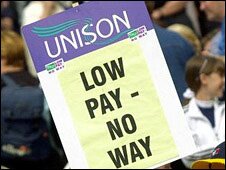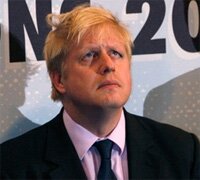Why aren’t unions united over pay rises?
 In a few short weeks delegates from all our trade unions will gather once more in Brighton for the Annual TUC Congress.
In a few short weeks delegates from all our trade unions will gather once more in Brighton for the Annual TUC Congress.
Last year’s Congress instructed the General Council to:
Give full support to affiliated unions’ efforts to protect their members’ real and relative pay levels, to oppose the Government’s two per cent pay target for public sector workers, and to co-ordinate a joint campaign of opposition at national and local levels to the Government’s unfair public sector pay limit, including co-ordinated joint industrial action.
What have we seen as a result of this decision?
Well, on Thursday 24 April, members of the National Union of Teachers (NUT) at schools in England and Wales took strike action alongside members of the University and Colleges Union (UCU) in the Further Education sector and about a third of the membership of the Public and Commercial Services Union (PCS).
Separately, UNISON and UNITE members in English, Welsh and Northern Irish local government services took strike action on Wednesday 16 and Thursday 17 July, along with a selection of PCS members in the civil service, whilst their Scottish local government counterparts (and members of the GMB who abstained from the action south of the border) are striking on Wednesday 20 August.
At the moment, three out of six trade unions in the Further Education sector have accepted 3.2% pay rises – breaking the 2% policy, but still falling short of price inflation.
But the unions are not united in the way they need to. Why?
Since last year’s Congress called for united action over public sector pay, there have been only the tiniest steps in that direction. In the mean time no group of public sector workers has settled a pay dispute above the rate of inflation – and none of those who have been taking action are yet close to a satisfactory settlement.
Those groups who are trying to fight against real terms pay cuts, in line with TUC policy, are caught in a trap from which it is difficult to mobilise members to participate in strike action – because the members don’t believe that we can win unless we take united action, but the united action we know we need isn’t really on the agenda.
But the TUC Congress called for coordinated action.
Sections of the leadership of the trade unions, and in particular of UNISON’s leadership do not want this – because they do not want to lose control of a pay dispute which could only be won by a frontal assault upon the Government and itss pay policy.
There are those who blame the relationship between UNISON and the Labour Party for this lack of enthusiasm. But a more plausible explanation is that UNISON’s leaders are seriously worried when our activists can compare and contrast their leadership with that of – for example – Mark Serwotka.
Anyone who attended the London strike rally on Wednesday 16 July left convinced that active UNISON members want united public sector strike action over pay and welcomed the leadership of those, such as Serwotka, who are trying to deliver it.
This year’s TUC will call once more for unified strike action public sector pay. But will the leadership of the main public service union continue to try to avoid this? We shall have to wait and see.
———————-
This article is part of a Liberal Conspiracy effort to feature more news and commentary on Trade Unions, which is increasingly missing from the national press.
-------------------------
Share this article
| post to del.icio.us |
This is a guest post. MarshaJane is a UNISON member, a member of the Labour Party, and the LRC (Labour Representation Committee) and Co-Chair of the LRC's Youth wing SYN (Socalist Youth Network). She blogs with others at Union Futures.
· Other posts by MarshaJane Thompson
Filed under
Blog , Economy , Trade Unions
3 responses in total ||
But we need to stop inflation which could destroy the economy. What if these strikes are just MI5 plots ot bring down the government? We shpuld get the rich taxed more. But we do need to keep wages under control we do not want to end like latin america.
We could end with another winter of discontent. Can’t they do that to the tories.
If this Government stopped behaving like Tories we wouldn’t need a pay dispute. As for Latin America, there are several Governments there who are doing rather better for their workers than ours is for us. And as for MI5, I wish on the one hand that the Government had not made itself so deeply unpopular that no one needs to conspire against it, and on the other hand that the trade union movement was still sufficiently significant to warrant the attentions of the security services.
Reactions: Twitter, blogs
Sorry, the comment form is closed at this time.
You can read articles through the front page, via Twitter or rss feeds.
» Why the coalition is swimming in bullshit
» Why raising taxes is the only progressive way to tackle the deficit
» Why the Zakir Naik ban is wrong
» I didn’t vote Libdems for this
» Shock as council refuses to endorse gay blood donation
» Why we’re making the case against government cuts
» Do the England squad need better incentives?
» Which Labour candidate can social democrats be proud of?
» Is the Telegraph censoring criticism of climate-change deniers?
» Three years on, Israel’s blockade is still illegal
» Did New Labour suffer from a contradiction in policy ideas?
|
33 Comments 96 Comments 13 Comments 14 Comments 62 Comments 21 Comments 22 Comments 11 Comments 23 Comments 8 Comments |
LATEST COMMENTS » damon posted on Tories try to rehabilitate disgraced advisor » sunny hundal posted on This is what a Labour agenda for women could look like » Alexander posted on Three years on, Israel's blockade is still illegal » Shuggy posted on Am I the world's freest woman? » Shatterface posted on Am I the world's freest woman? » Counterview posted on Tories try to rehabilitate disgraced advisor » Bob B posted on Why the coalition is swimming in bullshit » sally posted on Why the coalition is swimming in bullshit » Bob B posted on Why the coalition is swimming in bullshit » sally posted on Why the coalition is swimming in bullshit » Bob B posted on Why the coalition is swimming in bullshit » blanco posted on Why the coalition is swimming in bullshit » captain swing posted on Oona King unveils strong support against Ken » Bob B posted on Why the coalition is swimming in bullshit » LMO posted on Why the coalition is swimming in bullshit |
















